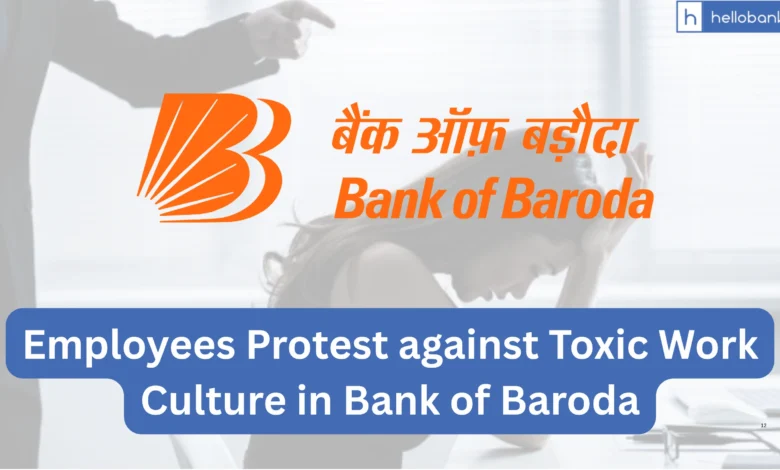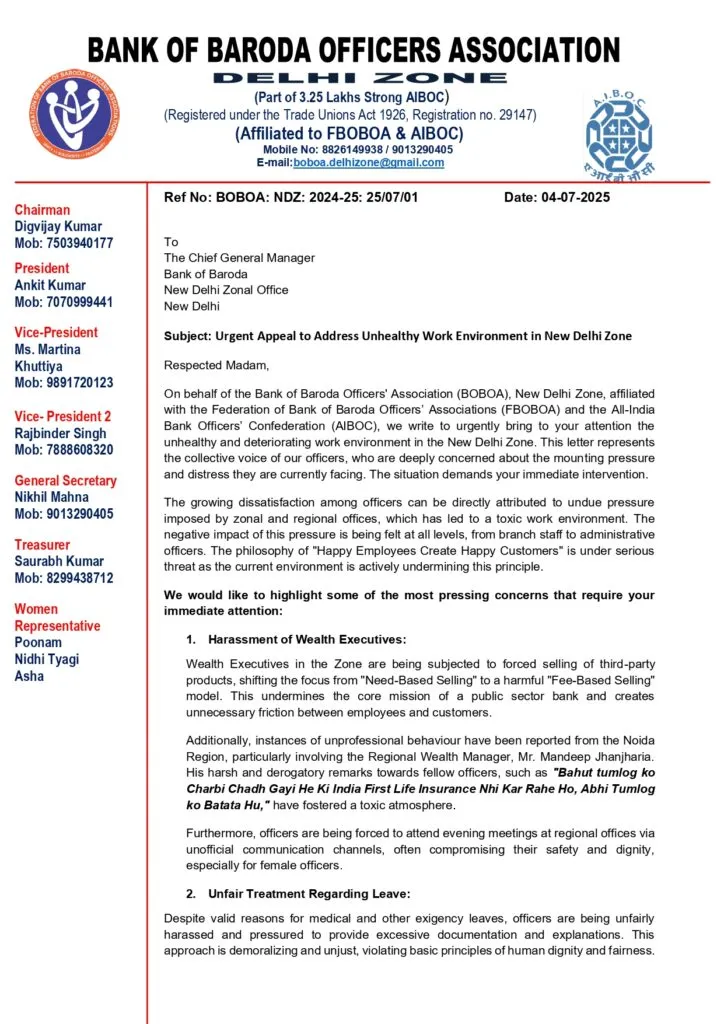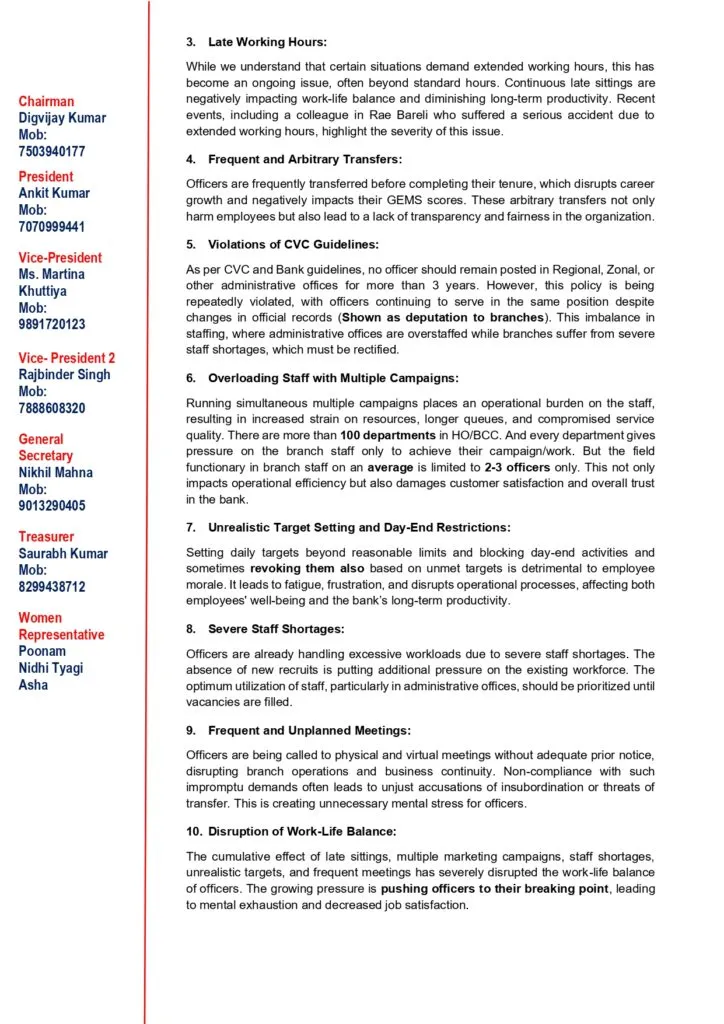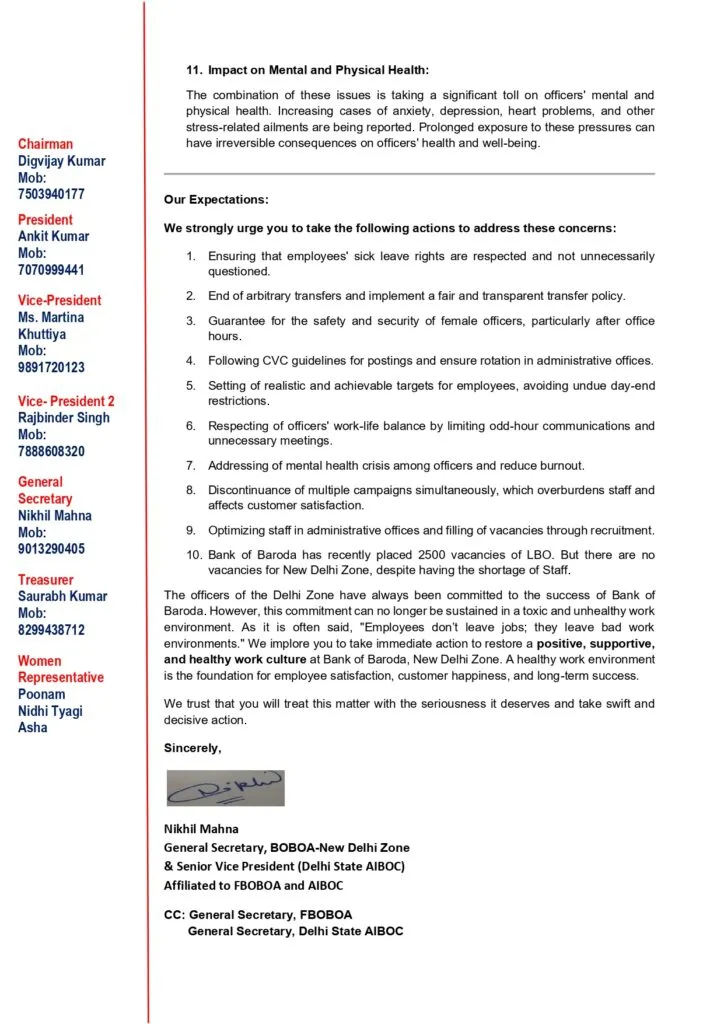‘Tumlog ko Charbi Chadh Gayi Hai’! Bank of Baroda Officers protest against Toxic Work Culture

Shri Nikhil Mahna, General Secretary, BOBOA-New Delhi Zone & Senior Vice President (Delhi State AIBOC) has written a strict letter to Chief General Manager (CGM) of Bank of Baroda, asking him to look into the toxic work environment prevailing in Bank of Baroda.
In his letter, he has highlighted the unhealthy and deteriorating work environment in the New Delhi Zone. There is a growing dissatisfaction among officers due to undue pressure imposed by zonal and regional offices, which has led to a toxic work environment. The negative impact of this pressure is being felt at all levels, from branch staff to administrative officers. The philosophy of “Happy Employees Create Happy Customers” is under serious threat as the current environment is actively undermining this principle.
Harassment Incidents Reported in Letter
Harassment of Wealth Executives:
Wealth Executives in the Zone are being subjected to forced selling of third-party products, shifting the focus from “Need-Based Selling” to a harmful “Fee-Based Selling” model. This undermines the core mission of a public sector bank and creates unnecessary friction between employees and customers.
Additionally, instances of unprofessional behaviour have been reported from the Noida Region, particularly involving the Regional Wealth Manager, Mr. Mandeep Jhanjharia. His harsh and derogatory remarks towards fellow officers, such as “Bahut tumlog ko Charbi Chadh Gayi He Ki India First Life Insurance Nhi Kar Rahe Ho, Abhi Tumlog ko Batata Hu,” have fostered a toxic atmosphere.
Furthermore, officers are being forced to attend evening meetings at regional offices via unofficial communication channels, often compromising their safety and dignity, especially for female officers.
Unfair Treatment Regarding Leave:
Despite valid reasons for medical and other exigency leaves, officers are being unfairly harassed and pressured to provide excessive documentation and explanations. This approach is demoralizing and unjust, violating basic principles of human dignity and fairness.
Late Working Hours:
Late-sitting has become an ongoing issue, often beyond standard hours. Continuous late sittings are negatively impacting work-life balance and diminishing long-term productivity. Recent events, including a colleague in Rae Bareli who suffered a serious accident due to extended working hours, highlight the severity of this issue.
Frequent and Arbitrary Transfers:
Officers are frequently transferred before completing their tenure, which disrupts career growth and negatively impacts their GEMS scores. These arbitrary transfers not only harm employees but also lead to a lack of transparency and fairness in the organization.
Violations of CVC Guidelines:
As per CVC and Bank guidelines, no officer should remain posted in Regional, Zonal, or other administrative offices for more than 3 years. However, this policy is being repeatedly violated, with officers continuing to serve in the same position despite changes in official records (Shown as deputation to branches). This imbalance in staffing, where administrative offices are overstaffed while branches suffer from severe staff shortages, which must be rectified.
Overloading Staff with Multiple Campaigns:
Running simultaneous multiple campaigns places an operational burden on the staff, resulting in increased strain on resources, longer queues, and compromised service quality. There are more than 100 departments in HO/BCC. And every department gives pressure on the branch staff only to achieve their campaign/work. But the field functionary in branch staff on an average is limited to 2-3 officers only. This not only impacts operational efficiency but also damages customer satisfaction and overall trust in the bank.
Unrealistic Target Setting and Day-End Restrictions:
Setting daily targets beyond reasonable limits and blocking day-end activities and sometimes revoking them also based on unmet targets is detrimental to employee morale. It leads to fatigue, frustration, and disrupts operational processes, affecting both employees’ well-being and the bank’s long-term productivity.
Severe Staff Shortages:
Officers are already handling excessive workloads due to severe staff shortages. The absence of new recruits is putting additional pressure on the existing workforce. The optimum utilization of staff, particularly in administrative offices, should be prioritized until vacancies are filled.
Frequent and Unplanned Meetings:
Officers are being called to physical and virtual meetings without adequate prior notice, disrupting branch operations and business continuity. Non-compliance with such impromptu demands often leads to unjust accusations of insubordination or threats of transfer. This is creating unnecessary mental stress for officers.
Disruption of Work-Life Balance:
The cumulative effect of late sittings, multiple marketing campaigns, staff shortages, unrealistic targets, and frequent meetings has severely disrupted the work-life balance of officers. The growing pressure is pushing officers to their breaking point, leading to mental exhaustion and decreased job satisfaction.
Impact on Mental and Physical Health:
The combination of these issues is taking a significant toll on officers’ mental and physical health. Increasing cases of anxiety, depression, heart problems, and other stress-related ailments are being reported. Prolonged exposure to these pressures can have irreversible consequences on officers’ health and well-being.
Demands by Bank of Baroda Officers
The Officers association has put forward its following demands:
- Ensuring that employees’ sick leave rights are respected and not unnecessarily questioned.
- End of arbitrary transfers and implement a fair and transparent transfer policy.
- Guarantee for the safety and security of female officers, particularly after office hours.
- Following CVC guidelines for postings and ensure rotation in administrative offices.
- Setting of realistic and achievable targets for employees, avoiding undue day-end restrictions.
- Respecting of officers’ work-life balance by limiting odd-hour communications and unnecessary meetings.
- Addressing of mental health crisis among officers and reduce burnout.
- Discontinuance of multiple campaigns simultaneously, which overburdens staff and affects customer satisfaction.
- Optimizing staff in administrative offices and filling of vacancies through recruitment.
- Bank of Baroda has recently placed 2500 vacancies of LBO. But there are no vacancies for New Delhi Zone, despite having the shortage of Staff.
With this letter, it’s expected that Bank of Baroda will look into the prevailing issues and address them at the earliest.



